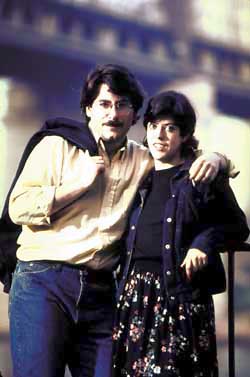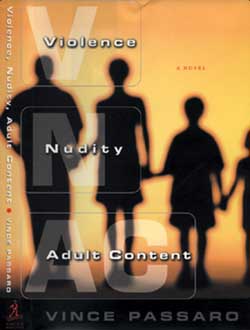|
|
 |
 |
 |
 |
|
FEATURESVince Passaro ’79 Waxes Poetic About Life — and ColumbiaBy Justine BlauOn a sweltering New York night last summer, so hot the air conditioning inside the Hungarian Pastry Shop on Amsterdam Avenue wasn’t holding its own against the humidity, writer Vince Passaro ’79 enjoyed his coffee and apple strudel and didn’t complain. Passaro loves New York, and accepts his city’s foibles with equanimity. Passaro had just come from his job as director of public relations at Baruch College. He’s also an established essayist and short story writer who frequently writes for publications such as Harper’s, The New York Times Magazine and New York. Simon & Schuster recently published his book, Violence, Nudity, Adult Content: A Novel.
The struggle to make ends meet in New York often makes its way into Passaro’s essays. He writes honestly and from a kind of intellectual-proletariat point of view about daily life in New York, and money is very much part of the picture. As James Marcus of The New York Times said in his review of Violence, Nudity, Adult Content, “Passaro has a superb feeling for the city’s beauty and banality.” Passaro can rattle off cost-of-living stats from the ’70s like it was yesterday. “It was anathema to us that you would need to find a career, instantly, the way students seem to do today. And that has to do with rent. In 1975, when I started at Columbia, the full tuition for the year was $3,400, and the maximum student loan guaranteed by New York State was $2,500. So even if you didn’t get heavy financial aid from any other source, you could swing it. Rents, if you shared, were anywhere from $80 to $120 a month, and if you lived alone, you paid about $180 to $220 a month, which means you could work part time, pay the rent, have a social life and pursue your interests.” An essay Passaro wrote for New York in 2001 is a sort of paean to his wife, the former Beth Stolz ’79 Barnard, as well as to Tom’s Diner and the joys of slackerdom on the Upper West Side:
Passaro met Beth during their sophomore year when she was struggling with a big bag of laundry and he chivalrously carried it for her to the laundry room at Barnard. They talked for hours. “We hung out a lot, starting almost immediately,” Passaro remembers. “She had a part-time job and classes, and I learned her schedule and thus frequently ‘ran into’ her. Hardly anyone ‘went out’ in those days ... that would imply a ‘date,’ which was a rare thing.” Ironically, the subject of laundry comes up again when Passaro talks about his relationship with Beth. “The marriage gets to such a refined point that she objects to my doing the dishes and laundry because she knows that I enjoy doing the dishes and laundry. And that’s no fair. ‘You only do what you like.’” Such domestic concerns, the earthy, nitty gritty issues of daily life, are fundamental to Passaro’s writing. About half of Violence, Nudity, Adult Content is about a marriage in trouble. It took Passaro about 10 years to write the book, in between his full-time job, helping to raise their three sons John, Jimmy and Paul, and writing for magazines on the side. It’s the story of a lawyer who’s working on two lurid cases while at the same time fighting for his marriage. Passaro admits that the character of the protagonist’s wife is based on Beth, although he denies that the main character is based on him: “He’s more competent than I am.”
Passaro said that Beth objected to certain scenes, but “the wife in the novel stabbed the guy in the face with a fork, and she never objected to that. No problem.” However, Passaro dedicated the novel to Beth, “miglior fabbro,” the better maker (a nod to T.S. Elliot, who dedicated The Wasteland to Ezra Pound with those words). It’s Passaro’s resistance to life’s prosaic struggles, yet his understanding that one must embrace the struggle, that imbues his writing with such compassion. Although his last name is Italian, Passaro describes himself as coming from a working class Irish-Catholic home in Great Neck, N.Y., because his father took off early on and Vince hardly saw him after that. His mother was Republican. “I almost got her to vote for McGovern. She was sort of a Rockefeller Republican.” His high school was all boys, all Republicans. “I was a little alienated,” he quips, as he talks ambivalently about his nine years in Catholic school. “They had a phenomenally great idea for encouraging kids to read and that was to faintly disapprove of books.” English classes were devoted to grammar. “Reading was something you did under the covers at night with a flashlight.” One of the gifts Passaro’s mother gave him was the belief that he could be anything he wanted, and he wanted to be a writer. “I didn’t worry about it,” he says. “It was a difficult adjustment for me, though, in the ’80s, to discover that because of rapid increases in the price of real estate and education, I couldn’t live like a permanent graduate student.” Passaro’s mother died the spring of his senior year of high school. When the boy from the suburbs, essentially orphaned, arrived at Columbia, he was exhilarated and intimidated. “What it felt like, especially after that dramatic a change in my circumstances, was that I’d been offered a magical escape from the culture of my youth. From a deeply provincial Irish Catholic working class community, I was almost shot out of a cannon into this other thing: a profoundly sophisticated culture dedicated largely to the life of the mind. It was like heaven, a trapdoor I discovered just in time. “What I discovered, though, and the reason I think I had to leave for a while, is that I wasn’t fully prepared for it. With little effort, I had been one of the most successful students in my world, and now I was a total naïf and completely a nobody academically. My first adviser, an administrator, who fortunately left that year, told me in our first meeting in freshman year, looking over my records, ‘Well, you’ll be a B student around here, and no more.’ I was stunned. Anyway, I found I couldn’t do the work; I was stupidly taking upper level classes, too, so I really was in over my head. I hated that feeling and stopped going to classes. “I got through freshman year, but by fall of sophomore year, I kind of lost interest. The time had come to deal with my mother’s death, with whom I might be now that I’d been so thoroughly separated from the world, the people and the home I’d grown up in. All were gone, essentially. “I dropped out again later for one year, strictly for money reasons. Each time I came back, I got vastly more out of it and didn’t finish until I was 24. I think everyone should take time off; a good education is wasted on the young.” It was while working as a doorman the summer of his sophomore year that Passaro met the professor who meant the most to him. “The single greatest teacher I was ever in the presence of is Edward Said,” Passaro recalls. “I was working in his building on Morningside Drive. I was reading Heart of Darkness in his lobby. He wrote his dissertation on Conrad ... he sort of went nuts that the elevator man was reading Heart of Darkness. We hit it off, and I ended up taking three classes with him. He had an enormous influence on me, in terms of my abilities to read and think. “He has a remarkable, penetrating and unapologetic mind. If something’s there, suggested in a book of literature, it doesn’t matter to him whether it conflicts with his convictions or sensibilities. He could look at something complex, like Conrad, and he’d break it down, and then put it back together in the most sort of fascinating and similarly complex way. And you’d come out of class with him with your mind racing.” Passaro describes another professor, Eric McKitrick, who taught American history, as a friend. He also fondly remembers English literature professor Wallace Gray, with whom he took his first creative writing class. “And three people who were hugely patient, understanding and helpful to me were Roberta Spagnola (later Campbell), who headed up residential life; Phyllis Zavatskly, who in those days ran financial aid virtually by herself, and was a saint; and Roger Lehecka ‘67, who was dean of students.” Before Violence, Nudity, Adult Content, Passaro tried to write a novel about Columbia in the ’70s. “It turned out that novels need grown-ups, and there were no grown-ups at Columbia in the ’70s. They had all disappeared. “Columbia was in a deep depression. It was an unbelievably good place to develop a contrary and artistic sensibility. It was full of skeptics, misfits, rejects and aggressive underachievers, and there was a very free creative atmosphere,” Passaro recalls. “I wouldn’t trade my experience for anything. I was profoundly affected by it. “Columbia, when I got there, was an environment in which the Left was still a vivid and even potentially dangerous force. We thought the students of 1968 were heroes. We knew all their names.” Another great influence on Passaro during his Columbia years were the friends he made. “Almost all the people I really care about in my life were people I met there — my wife, my closest friends. I look back on the years that I was in and around Columbia, and I delight in remembering the freedom and the movies and the books and the coffee. But it’s also a time of intense confusion and pain, and for anyone who is experiencing it now, it’s very hard to imagine that you can grow out of those things. But you can. “You know, I wouldn’t be 22 again if you paid me. I’d take the body, though.”
|
|
||||||||||||||||||||||||||||||||||||||||||||||||||||||||||||

